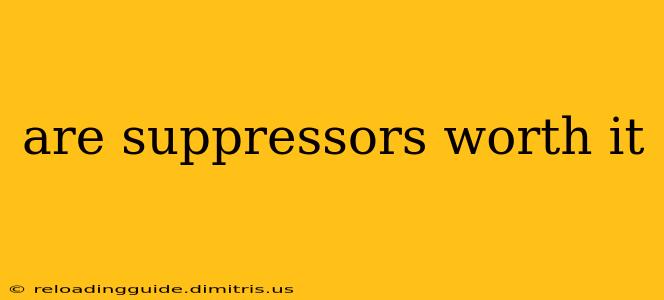The question of whether suppressors (also known as silencers) are "worth it" is complex, depending heavily on individual priorities and circumstances. This guide will explore the pros and cons, addressing common misconceptions and providing a balanced perspective to help you decide.
Understanding Suppressors: More Than Just Silence
Before diving into the "worth it" question, it's crucial to understand what suppressors actually do. They don't eliminate all sound—Hollywood depictions are wildly inaccurate. Instead, they significantly reduce the sound of a gunshot, typically by 20-35 decibels. This translates to a noticeable difference, making the sound more manageable and less jarring.
Furthermore, suppressors offer several other benefits beyond noise reduction:
- Reduced Recoil: By containing expanding gases, suppressors can lessen felt recoil, improving shooter comfort and accuracy, especially for less experienced shooters or those using powerful calibers.
- Improved Hearing Protection: While not eliminating the need for hearing protection entirely, suppressors drastically reduce the risk of hearing damage, allowing for more comfortable and extended shooting sessions.
- Reduced Flash & Muzzle Blast: The contained gases also lessen muzzle flash and the powerful blast of air exiting the barrel, improving visibility and reducing the risk of eye injury in low-light conditions.
- Increased Accuracy: Reduced recoil and muzzle rise directly contribute to increased accuracy and improved shot grouping, especially for rapid-fire situations.
The Cost Factor: Initial Investment and Ongoing Expenses
Suppressors are a considerable investment. The initial purchase price varies widely depending on the caliber, manufacturer, and features. Beyond the purchase price, you must also consider:
- Tax Stamp: In most jurisdictions, owning a suppressor requires a lengthy and often expensive permitting process, including a tax stamp. This process can take several months or even longer.
- Maintenance: Like any firearm accessory, suppressors require regular cleaning and maintenance to ensure optimal performance and longevity. Neglecting maintenance can lead to malfunctions and decreased effectiveness.
The "Worth It" Verdict: Weighing the Pros and Cons
Ultimately, whether a suppressor is "worth it" is a personal decision based on your individual needs and priorities.
Reasons it might be worth it:
- Competitive Shooting: For precision shooting sports, the reduced recoil and increased accuracy benefits are significant.
- Hunting: Hunters often appreciate the reduced noise, allowing for quieter shots and potentially a cleaner kill. Suppressors can also be beneficial for reducing hearing damage from frequent shots.
- Law Enforcement & Military: In these contexts, the reduced noise and recoil benefits, along with improved accuracy, can be crucial.
- Recreational Shooting: For those who enjoy regular shooting, the improved comfort and hearing protection offered by suppressors can be invaluable.
Reasons it might not be worth it:
- High Initial Cost: The significant upfront investment and lengthy permitting process can be a major deterrent.
- Maintenance Requirements: Regular cleaning and maintenance add to the overall cost and time commitment.
- Legal Restrictions: Laws regarding suppressor ownership and use vary significantly by location, and restrictions can make ownership impractical or illegal in certain areas. Always check your local and state regulations before purchasing a suppressor.
Conclusion: Due Diligence is Key
Before deciding whether a suppressor is worth it for you, thoroughly research your local laws, consider the initial and ongoing costs, and weigh the benefits against your individual shooting needs and preferences. Talking to experienced shooters and firearm professionals can provide valuable insights and help you make an informed decision. Suppressors are a significant investment, and careful consideration is essential.

